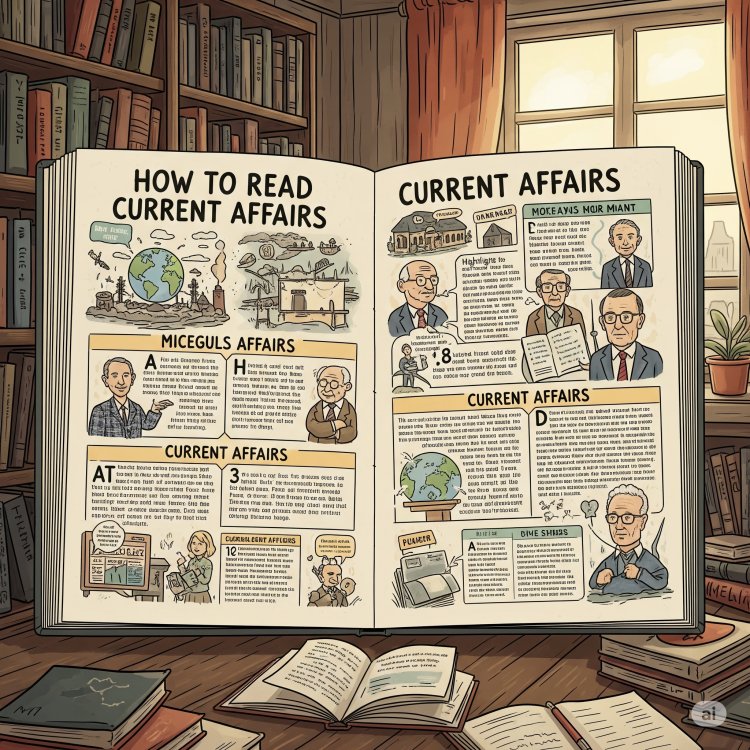How to Read Current Affairs for UPSC
You can’t crack UPSC just by mugging up NCERTs. Current affairs are your gateway to understanding the practical side of governance, economics, and international relations. Every topper talks about it and for good reason.
Share this Post to earn Money ( Upto ₹100 per 1000 Views )

Why Current Affairs Matter in UPSC Preparation
You can’t crack UPSC just by mugging up NCERTs. Current affairs are your gateway to understanding the practical side of governance, economics, and international relations. Every topper talks about it and for good reason.
The Weightage in Prelims, Mains and Interview
In Prelims, around 20-30 questions revolve around current affairs. In Mains, almost every answer benefits from a current example. In the Interview? They grill you on what's happening around you.
Real-Time Application of Static Knowledge
Current affairs aren’t floating in isolation. A news piece about the RBI isn’t just news, it’s a prompt to revise monetary policy. That’s where the game changes.
Understanding the UPSC Current Affairs Syllabus
Unlike optional subjects, UPSC doesn’t give a precise syllabus for current affairs. But here’s the trick, it’s hidden in the GS papers.
What Topics to Focus On
Focus on:
-
Polity & Governance
-
Economy
-
Environment
-
Science & Tech
-
International Relations
-
Social Issues
-
Government Schemes & Reports
Connecting Current Events to GS Papers
For example, if Parliament passes a new bill, it will be linked directly to GS Paper 2 (Polity and Governance). Train your brain to spot these links.
The Ideal Time to Start Reading Current Affairs
How Early Is Too Early?
If you're more than a year away from Prelims, start slow. Don’t burn out early. But start building the habit.
Smart Planning Over Long-Term Coverage
One year of focused current affairs prep (especially from June of the previous year) is more than enough if done right.
Best Sources for UPSC Current Affairs
Newspapers: The Hindu vs Indian Express
Both are good. The Hindu is more analytical, while the Indian Express is clearer and straightforward. Pick one, not both.
Monthly Magazines: Yojana, Kurukshetra & Others
Yojana and Kurukshetra are goldmines for essay and GS Paper 2 & 3. Vision IAS and Insights provide concise compilations.
Online Platforms: Khan Global Studies, PIB, and More
Khan Global Studies provides daily editorials, weekly compilations, and Prelims booster PDFs. Plus, their integrated approach with GS topics is very UPSC-centric.
How to Read Newspapers for UPSC
What to Read and What to Skip
Read:
-
Editorials
-
Government Schemes
-
SC Judgements
-
Policy Announcements
Skip:
-
Political rallies
-
Celebrity gossip
-
Pure crime stories
Notes-Making While Reading the Paper
Use a digital app or a notebook. Summarise in bullets. Focus on the ‘why’ and ‘impact’, not the full story.
Daily, Weekly and Monthly Strategy
Structuring Daily Routine
-
1-1.5 hrs daily for current affairs
-
Read the newspaper + 20 mins for note-making
Weekly Revisions and Monthly Consolidation
Make Sunday your revision day. Read a monthly magazine at month-end to fill gaps.
Effective Note-Making Techniques
Digital vs Traditional Notes
Digital is easier to organise and search. Apps like Notion or Evernote help with tagging and structuring.
Tools to Make Notes: OneNote, Notion, Evernote
Pick one. Consistency > Tool. Don’t switch often.
How to Link Current Affairs to Static Subjects
Polity, Economy, Geography, and Environment
News about GST? Revisit indirect taxes. Environmental protests? Link to the Environment Protection Act.
Integrated Approach for Main Answer Writing
Add current examples in the body or conclusion. It shows awareness and gives you an edge.
Using Khan Global Studies for UPSC Current Affairs
Key Features of KGS Notes and Analysis
-
Topic-wise arrangement
-
Daily editorials simplified
-
Prelims-focused PDFs
-
Mains answer writing practice
How to Integrate KGS Resources into Your Study Plan
-
Read their daily news updates
-
Consolidate weekly with their PDFs
-
Practice mains questions they provide
Avoiding Common Mistakes in Current Affairs Prep
Information Overload
Don’t try to read 10 sources. Stick to 2–3 reliable ones and revise regularly.
Ignoring Revision and Analysis
Reading without revision = wasted effort. Apply what you read through mocks and answers.
Role of Revision in Mastering Current Affairs
Repetition as the Key to Retention
Revise weekly and monthly. Use colour-coded highlights. Re-read your notes, not the paper again.
Revision Strategy Before Exams
Make a 3-month compilation. Focus on issues that are repeatedly in news. Revise the Prelims booster from KGS.
Mock Tests and Answer Writing Practice
Applying Current Affairs in Mains
Write 2–3 questions weekly. Use examples from current events to support your points.
Practicing Daily and Weekly Questions
Daily answer writing from KGS or similar platforms can make a massive difference.
How to Stay Consistent with Current Affairs
Building the Habit
Set a fixed time. Pair it with morning tea. Make it a ritual, not a chore.
Keeping Motivation Alive
Join Telegram channels, group discussions or peer groups. Accountability boosts consistency.
Final 3-Month Strategy Before Prelims
Focused Revision and Compilation
Use monthly compilations, KGS Prelims booster, and revise daily notes aggressively.
Prioritising Important Issues
Focus on:
-
International summits
-
Govt schemes
-
Environment reports
-
Economic policies
Final Words: Mastering Current Affairs Smartly
Reading current affairs for UPSC isn’t about being a news junkie—it’s about being a smart learner. With the right sources, strategy, and consistency, you’ll not only understand the world better but also crack one of India’s toughest exams with confidence.
FAQs
1. How many hours should I spend on current affairs daily?
About 1–1.5 hours is enough if you're consistent and focused.
2. Is one year of current affairs enough for UPSC?
Yes, one solid year is sufficient if you revise and consolidate properly.
3. Should I make notes from newspapers?
Absolutely. Personal notes help during revision and last-minute prep.
4. Can I skip newspapers and rely only on monthly compilations?
You can, but it’s not ideal. Newspapers give context and develop analytical skills.
5. Is Khan Global Studies a reliable source for current affairs?
Yes, it's known for UPSC-oriented content and structured notes that simplify complex topics.
Originally published at http://kgsupsc.wordpress.com on May 23, 2025.















